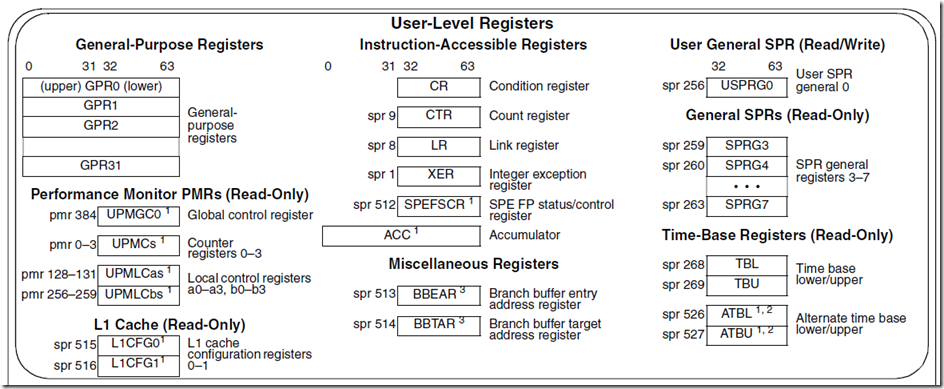1. 准备:
1.1. 资料收集
去freescale的网站上下载下面的几个pdf文件:
| 名称 | 内容 |
| EREFRM.pdf | A Programmer's Reference Manual for Freescale Embedded Processors |
| E500CORERM.pdf | PowerPC™ e500 Core Family Reference Manual |
| E500ABIUG.pdf | PowerPC™ e500 Application Binary Interface User's Guide |
| MPC5554.pdf | MPC5554 Microcontroller Data Sheet |
| MPC5553_MPC5554_RM.pdf | MPC5553/5554 Microcontroller Reference Manual |
1.2. Linux源代码下载:
2. CPU学习
2.1. 寄存器
E500内核寄存器分为用户模式(ULR)和特权模式(SLR):
它们的访问受MSR(Machine State Register)的PR位的控制,PR=0时可以访问SLR。而MSR只有处于特权模式下才能访问,因此只有通过中断、系统调用和异常才能实现用户态到特权态的切换。
MSR寄存器如下所示:
在linux-2.6.33\arch\powerpc\include\asm\reg_booke.h中可以看到,Linux如下定义MSR的各个位:
/* Machine State Register (MSR) Fields */ #define MSR_SF_LG 63 /* Enable 64 bit mode */ #define MSR_ISF_LG 61 /* Interrupt 64b mode valid on 630 */ #define MSR_HV_LG 60 /* Hypervisor state */ #define MSR_VEC_LG 25 /* Enable AltiVec */ #define MSR_VSX_LG 23 /* Enable VSX */ #define MSR_POW_LG 18 /* Enable Power Management */ #define MSR_WE_LG 18 /* Wait State Enable */ #define MSR_TGPR_LG 17 /* TLB Update registers in use */ #define MSR_CE_LG 17 /* Critical Interrupt Enable */ #define MSR_ILE_LG 16 /* Interrupt Little Endian */ #define MSR_EE_LG 15 /* External Interrupt Enable */ #define MSR_PR_LG 14 /* Problem State / Privilege Level */ #define MSR_FP_LG 13 /* Floating Point enable */ #define MSR_ME_LG 12 /* Machine Check Enable */ #define MSR_FE0_LG 11 /* Floating Exception mode 0 */ #define MSR_SE_LG 10 /* Single Step */ #define MSR_BE_LG 9 /* Branch Trace */ #define MSR_DE_LG 9 /* Debug Exception Enable */ #define MSR_FE1_LG 8 /* Floating Exception mode 1 */ #define MSR_IP_LG 6 /* Exception prefix 0x000/0xFFF */ #define MSR_IR_LG 5 /* Instruction Relocate */ #define MSR_DR_LG 4 /* Data Relocate */ #define MSR_PE_LG 3 /* Protection Enable */ #define MSR_PX_LG 2 /* Protection Exclusive Mode */ #define MSR_PMM_LG 2 /* Performance monitor */ #define MSR_RI_LG 1 /* Recoverable Exception */ #define MSR_LE_LG 0 /* Little Endian */ #define MSR_GS (1<<28) /* Guest state */ #define MSR_UCLE (1<<26) /* User-mode cache lock enable */ #define MSR_SPE (1<<25) /* Enable SPE */ #define MSR_DWE (1<<10) /* Debug Wait Enable */ #define MSR_UBLE (1<<10) /* BTB lock enable (e500) */ #define MSR_IS MSR_IR /* Instruction Space */ #define MSR_DS MSR_DR /* Data Space */ #define MSR_PMM (1<<2) /* Performance monitor mark bit */ #define MSR_CM (1<<31) /* Computation Mode (0=32-bit, 1=64-bit) */ #if defined(CONFIG_PPC_BOOK3E_64) #define MSR_ MSR_ME | MSR_CE #define MSR_KERNEL MSR_ | MSR_CM #define MSR_USER32 MSR_ | MSR_PR | MSR_EE #define MSR_USER64 MSR_USER32 | MSR_CM #elif defined (CONFIG_40x) #define MSR_KERNEL (MSR_ME|MSR_RI|MSR_IR|MSR_DR|MSR_CE) #define MSR_USER (MSR_KERNEL|MSR_PR|MSR_EE) #else #define MSR_KERNEL (MSR_ME|MSR_RI|MSR_CE) #define MSR_USER (MSR_KERNEL|MSR_PR|MSR_EE) #endif
从上面红色内容可以看出,Linux内核态和用户态MSR的区别。
Linux进程启动函数(execve)中,需要从系统态到用户态转换这个转换函数在start_thread()中完成,如下:
void start_thread(struct pt_regs *regs, unsigned long start, unsigned long sp)
{
set_fs(USER_DS);
/*
* If we exec out of a kernel thread then thread.regs will not be
* set. Do it now.
*/
if (!current->thread.regs) {
struct pt_regs *regs = task_stack_page(current) + THREAD_SIZE;
current->thread.regs = regs - 1;
}
memset(regs->gpr, 0, sizeof(regs->gpr));
regs->ctr = 0;
regs->link = 0;
regs->xer = 0;
regs->ccr = 0;
regs->gpr[1] = sp;
/*
* We have just cleared all the nonvolatile GPRs, so make
* FULL_REGS(regs) return true. This is necessary to allow
* ptrace to examine the thread immediately after exec.
*/
regs->trap &= ~1UL;
regs->mq = 0;
regs->nip = start;
regs->msr = MSR_USER;
discard_lazy_cpu_state();
#ifdef CONFIG_VSX
current->thread.used_vsr = 0;
#endif memset(current->thread.fpr, 0, sizeof(current->thread.fpr));
current->thread.fpscr.val = 0;
#ifdef CONFIG_ALTIVEC
memset(current->thread.vr, 0, sizeof(current->thread.vr));
memset(¤t->thread.vscr, 0, sizeof(current->thread.vscr));
current->thread.vscr.u[3] = 0x00010000; /* Java mode disabled */
current->thread.vrsave = 0;
current->thread.used_vr = 0;
#endif /* CONFIG_ALTIVEC */
#ifdef CONFIG_SPE
memset(current->thread.evr, 0, sizeof(current->thread.evr));
current->thread.acc = 0;
current->thread.spefscr = 0;
current->thread.used_spe = 0;
#endif /* CONFIG_SPE */
}








